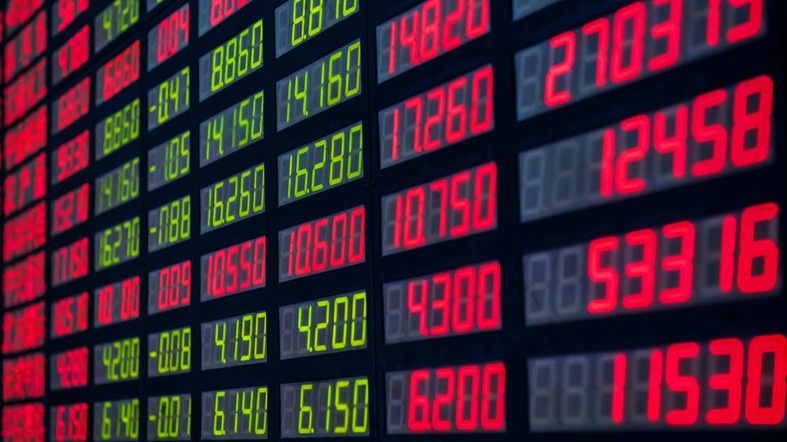- Stock Market Struggles for Recovery Amid N3.4tn Loss
The nation’s stock market is struggling to rebound as efforts to lure back investors received a boost following the creation of a new foreign-exchange window by the Central Bank of Nigeria.
The stock market, said to be one of best performing frontier markets globally until 2013, has been in the doldrums for the past two years as investor confidence continued to sag.
Many investors who were spooked by the low liquidity levels and currency curbs in the country have yet to return to the market.
Capital market analysts say not a few local investors have exited the stock market in favour of less volatile fixed-income instruments such as government’s Treasury bills with high yields.
The market capitalisation of listed equities on the Nigerian Stock Exchange closed at N8.913tn on Friday, up from N8.716tn last week.
The NSE market capitalisation, which hit a peak of N12.135tn on April 2, 2015, fell to N9.25tn at the end of last year.
Foreign transactions on the NSE plunged to N518bn last year from as high as N1.54tn in 2014, when oil prices peaked at $115 per barrel.
The nation’s currency crisis occasioned by the sharp drop in oil prices since mid-2014 led to equities sell-offs by foreign and local investors.
The value of trading on the NSE dropped by 22.3 per cent to N74.1bn in February from N95.32bn in January, according to the latest Domestic and FPI Report.
Domestic transactions decreased by 22.88 per cent from N51.31bn recorded in January to N39.57bn in February; foreign transactions also decreased by 21.52 per cent from N44.01bn to N34.54bn.
The Chief Executive Officer, Cowry Asset Management Limited, Mr. Johnson Chukwu, said two factors would lead to the stability of the equities market.
He said, “One is the local policy environment. Today, we have yields on the Federal Government’s treasury bills of three to four-day maturity at about 18.9 per cent. So that yield is higher than any dividend yield you expect.
“So, with a yield in fixed income of about 18.9 per cent, local investors will prefer fixed income instruments to equities.”
He said foreign portfolio investors would also prefer fixed-income instruments to equities instrument.
Chukwu said, “But beyond that, foreign portfolio investors need to invest in a market where there is dollar liquidity and then the market is transparent in the pricing of foreign currencies. Both do not currently exist in the Nigerian economy.
He said those factors plus the elevated yield on fixed-income instruments had served as disincentives for investors to invest in equities.
“Until those factors are addressed, we are not going to see a bullish run in or any consistent rally in the equities market,” Chukwu added.
On April 21, the Central Bank of Nigeria established a forex widow for investors and exporters to boost liquidity in the forex market and ensure timely execution and settlement for eligible transactions.
The Acting Managing Director, Afrinvest Securities Limited, Mr. Ayodeji Ebo, said, “It all boils down to investors’ confidence, which is key. If you look at the way the equities market is structured, the participation of foreign portfolio investors cannot be ignored.
“If the new window is effectively implemented, it will help boost confidence because foreign investors are more interested in liquidity and they easily exit the market.”
According to him, a lot of foreign investors’ funds are still trapped in Nigeria waiting for when they will get dollars at the appropriate rate.
“This has dampened the foreign investors’ confidence significantly such that they are not bringing in more; they try as much as possible to take out,” he said.
He said on the domestic front, the direction of the economy had not been very clear although the government was doing a lot to ensure that.
Ebo said, “So, in times of uncertainty, people don’t spend; and once they don’t spend, it will affect the results of quoted companies and participation will also reduce. So, it is more of restoring confidence.”
The Board Chairman, Nigerian Economic Summit Group, Mr. Kyari Bukar, “It is the lack of clarity on the foreign exchange policy that is making them (foreign investors) to stay on the sidelines.
“If they see that clarity, they will begin to bring in their money. With the foreign portfolio investors, there has to be absolute clarity in the sense that they can easily come in and go out at a market-determined rate rather than a rate that someone sets and could change overnight.”

 Billionaire Watch3 weeks ago
Billionaire Watch3 weeks ago
 Startups4 weeks ago
Startups4 weeks ago
 News4 weeks ago
News4 weeks ago
 News4 weeks ago
News4 weeks ago
 Bitcoin4 weeks ago
Bitcoin4 weeks ago
 Naira4 weeks ago
Naira4 weeks ago
 Forex3 weeks ago
Forex3 weeks ago
 Treasury Bills4 weeks ago
Treasury Bills4 weeks ago
























